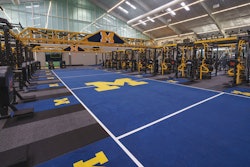
Athletics administrators know that listening is an important skill. Hearing honest feedback from coaches, fans and boosters is one key to running a successful department.
In addition to hearing from and responding to the feedback that these constituencies provide, it's also important to hear from student-athletes to gain valuable insight into their programs and the student-athlete experience. One way that athletic directors can provide student-athletes with a platform to voice their opinions is through well-designed surveys.
"We're in an era where a student-athlete's voice has never been stronger," says Michael Cross, co-owner and co-founder of Athlete Viewpoint, a tool that helps athletic directors glean better data from student-athlete surveys. "We're in an environment where student-athletes have come up through youth leagues and youth coaching situations and are accustomed to giving feedback and providing insight on what their experience is like."
A good survey — one that asks the right questions and prompts sincere responses — can help administrators drill down beyond "vanity" metrics, which Cross defines as feel-good information that fails to provide administrators with actionable data.
"It's nice to get a question that says everything's all sunshine and roses," he says, "but if the questions that are being asked don't give you insight as to how to act upon [that data], then you're really at a loss as to what to do."
Athletic directors can use surveys to gather opinions from student-athletes on virtually any topic. Want to know how your facilities measure up against competitor institutions? Or how about gaining a better understanding of how a coach communicates in practice? Surveys can even be helpful in understanding team attitudes on things such as drug and alcohol use, hazing, and other broad social issues.
This kind of survey data can help athletic directors and departments stay aware of situations facing particular student-athlete groups. A freshman's experience will invariably differ from that of a senior. Similarly, minority student-athletes may face a different set of challenges than those from majority populations.
"If you have an understanding that, say, your African-American student-athletes are not having an experience that is similar to your majority-white student-athletes, that's something that you should be paying attention to and trying to figure out why that is the case," says Cross. "Is that something that's particular to your campus? Is that a lack of mentorship or of seeing people in leadership roles who are similar to your student-athletes? Is that something that's particular to your town and your community?"
Surveys, of course, are not a panacea for any problems that may arise in an athletic department, but the data they generate can provide a valuable starting point. With limited budgets and resources, survey data can help athletics administrators steer their dollars in the right direction.
Despite the versatility of a good survey, Cross recommends keeping questions focused on issues within the purview of the athletic department.
"It might be helpful to know, for example, that student-athletes don't really care for 8 o'clock classes," he says, "but if that's the only time a particular course is offered that's required for a major, that's not really in the purview of the athletic department to deal with."
Moreover, surveys aren't the only way that athletic directors can hear from their student-athletes. University of Maryland athletic director Kevin Anderson holds regular open forums for student-athletes to discuss whatever comes to mind — including such touchy subjects as race and politics.
"I wanted to have a forum with our student-athletes where we could talk about all of these worldly issues," Anderson told The Washington Post. "Not about athletics, not about academics, but what's on your mind? What are you feeling? How do you see this? I just wanted to sit down and hear what they were thinking."
That kind of environment helps give Terrapin student-athletes a feeling that they're being heard, which is of unique importance in an era of boycotts, protests and demonstrations that have, in recent years, impacted several college athletic departments.
"At the end of the day, we're told he runs this multimillion-dollar business and he has all these expectations and stress that goes with selling the product of University of Maryland athletics," Alex Leto, a senior track athlete, told the Post. "So he's head honcho, he's doing his job, but then he brings himself down to a personal level and just wants to talk with us."
Focusing on the student-athlete voice is one way that athletic departments can show that they value that voice. By making a concerted effort to gather student-athlete feedback, administrators can show they take seriously the responsibility of playing a positive role in the lives of young men and women.
Cross knows that administrators are interested in providing a great experience for their student-athletes, and that a great experience goes far beyond the results on the field.
"Right now, within college athletics, the biggest metrics that we have to measure whether or not student-athletes are getting it done are winning and losing on the field, team GPA, grad-rate, and maybe your APR score," he says. "Those are some pretty high-level things that really don't give you any insight into the day-to-day experience of your athletes in ways that allow you to make the experience better."
Cross adds that college athletic directors also have a role to play in the mentorship, health and wellbeing of their student-athletes.
"It's important to understand whether you're delivering on those things."
This article originally appeared in the November|December 2017 issue of Athletic Business with the title "Survey says: Listening to student-athletes provides valuable insight." Athletic Business is a free magazine for professionals in the athletic, fitness and recreation industry. Click here to subscribe.

































